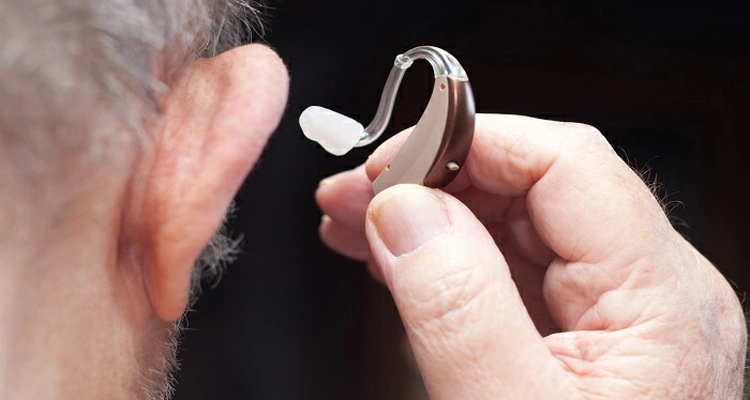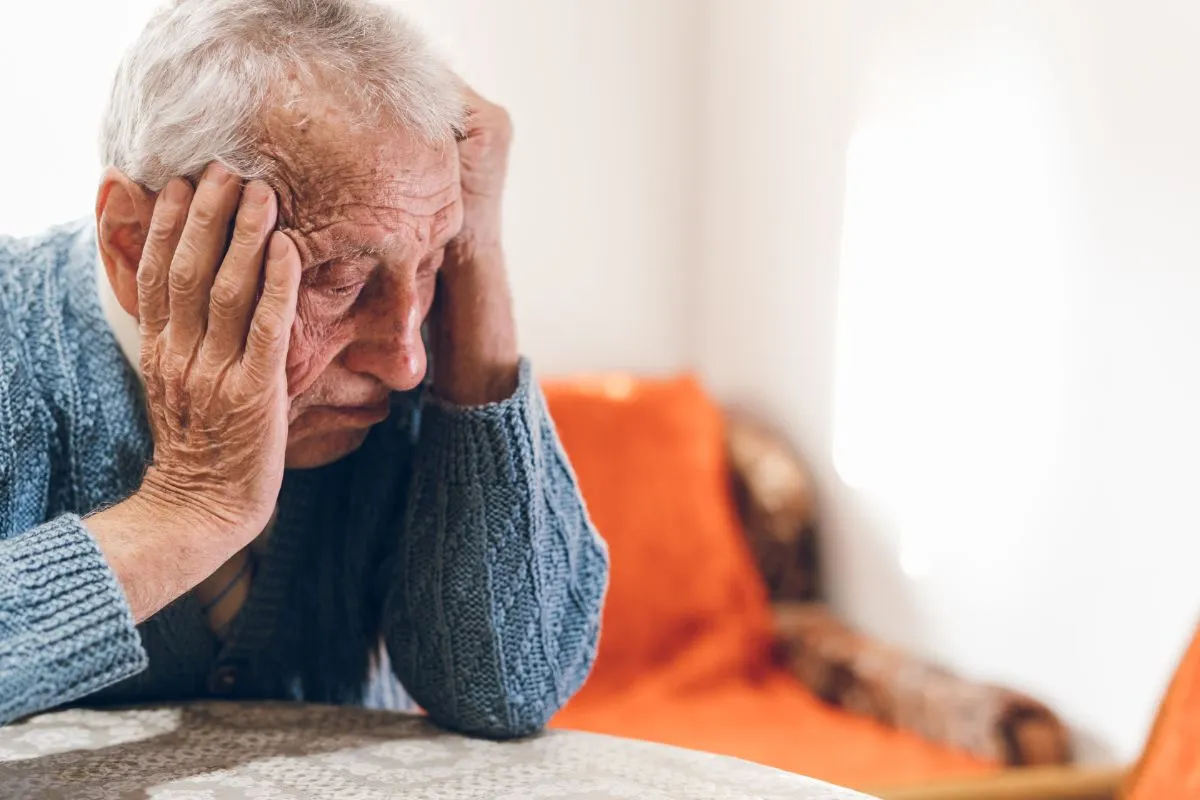
How to Coping With Hearing Loss and Isolation in Seniors
Aging brings with it many challenges, one of which is hearing loss. Hearing loss in the elderly is most commonly associated with isolation. There are many ways for coping with hearing loss and isolation in seniors. In fact, hearing loss in the elderly is a very common disease that manifests itself in people over 65 years of age.
Many factors can affect hearing loss in the elderly, and in this article we intend to introduce you to the causes of hearing loss in the elderly, signs of hearing loss in the elderly, degrees of hearing loss, and methods of treating hearing loss in the elderly. We suggest that you join us until the end of this article from humanhealthmag to obtain sufficient information about methods of coping with hearing loss in the elderly and dealing with isolation in these people.
Causes of Hearing Loss in the Elderly
The main cause of hearing loss in the elderly is damage to the very small hair cells in the ear. Fortunately, there are many ways to cope with hearing loss and isolation in seniors. Of course, various factors can be effective in damaging these cells and ultimately causing hearing loss in the elderly. These reasons can directly and indirectly reduce a person’s hearing. Also, one of the most important causes of social isolation of seniors is hearing loss. Factors or causes of hearing loss include:
- Slow death of neurons responsible for hearing with age
- Decreased ability of the brain to respond to sounds due to age
- Thickening of the ear artery wall and impact on the cochlear vessels
- Accumulation of earwax in the ear canal
- Reduced hearing loss due to diabetes
- High blood pressure
- Use of chemical drugs over the years
- Viruses and bacteria
- Heredity
- Smoking
- Brain damage or tumor
- Exposure to very loud noises
- Changes in the structure of the inner ear
- Damage to the auditory nerves

Symptoms of Hearing Loss in the Elderly
To cope with hearing loss and isolation in seniors, you must first become familiar with the symptoms of this problem. Symptoms of hearing loss in the elderly appear gradually, and at first, the person himself and those around him may not realize the severity of this problem. As time passes and this condition progresses, hearing loss leads to problems in establishing daily communication and the quality of life of the elderly. Hearing is one of the five senses in seniors and can be strengthened in various ways. Some of the most important symptoms of hearing loss in the elderly include the following:
Decreased ability to hear quiet sounds
- One of the early signs of hearing loss in the elderly is difficulty hearing quiet sounds. The elderly may have to concentrate more in daily conversations, especially in quiet environments, to hear quiet sounds. This problem may also become more severe in telephone conversations, because low sound can cause confusion and inability to follow conversations. Therefore, the home caregiver should pay special attention to these symptoms.
Sensitivity to loud sounds
- Some elderly people feel that the sounds around them are louder than they really are. This problem, which is related to a type of hearing sensitivity, occurs due to changes in the auditory system and the brain’s function in processing sounds. In such situations, loud sounds such as the sound of the television, music, or even the voices of others in crowded environments, become unpleasant and annoying for the person.
Difficulty recognizing speech in crowded environments
- One of the main problems for people with hearing loss is that they cannot easily recognize the voice of their interlocutor in crowded environments, such as markets, busy streets, or restaurants. This is because hearing loss disrupts the filtering of background noises and the brain can no longer separate essential sounds from distracting sounds. This naturally causes confusion, mental fatigue, and a tendency to isolate in older people.
Tendency to increase the volume of the TV or radio
- To compensate for hearing loss, older people turn up the volume of the TV, radio, or other audio devices more than usual. This can be annoying to other family members or neighbors and, at the same time, a sign of a hearing problem. This behavior often occurs while the older person gradually realizes the need to increase the volume of the TV and resists accepting the problem.
Ringing or abnormal noise in the ears
- A ringing or buzzing sound in the ears, also known as tinnitus, is another common symptom of hearing loss and senility. These sounds are heard as a continuous or intermittent noise in one or both ears and are usually more noticeable during the quiet of the night or in quiet environments. These symptoms can range from mild to severe and can cause stress and insomnia for some seniors. This ringing or noise sensation may be caused by damage to the auditory cells in the ear that occurs with age.
Frequently asking for things to be repeated
- Seniors with hearing loss often ask others to repeat themselves or speak louder. This behavior is a clear sign of hearing loss and often occurs because the senior cannot receive and process all the words correctly. Especially in fast-paced conversations or when faced with similar words, the elderly may have difficulty recognizing some sounds and may therefore ask others to repeat their sentences.
Gradual increase in loneliness and isolation
- In addition to physical hearing problems, hearing loss can have a profound impact on the mental and social state of the elderly. Hearing loss causes the elderly to participate less in conversations and social activities, as they become frustrated with the ability to understand others correctly and, over time, tend to isolate themselves and distance themselves from friends and family.
Degrees of Hearing Loss in the Elderly
To cope with hearing loss and isolation in seniors, you need to be familiar with the type and level of hearing. Hearing loss in the elderly can have different degrees, and the treatment method for each of these degrees can be different. The degrees of hearing loss in the elderly can be as follows:
- Simple damage: In this case, the patient is only unable to hear weak sounds and can hear all words and sounds well.
- Moderate damage: In this degree of hearing loss, the patient also has difficulty hearing loud sounds.
- Severe damage: In this case, the elderly person is unable to hear sounds and suffers from deafness.

Methods of Coping With Hearing Loss and Isolation in Seniors
Reduction or loss of hearing in the elderly begins at the age of 65 and above, which is an irreversible problem and hearing loss cannot be cured. Presbycusis in the elderly can also cause hearing loss. Fortunately, various methods such as using hearing aids can greatly amplify the surrounding sounds and compensate for the damage caused. The most important methods of treatment and coping with hearing loss and isolation in seniors include the following:
- Using hearing aids: Hearing disorders cannot be cured in general, only auxiliary methods can be used to solve this problem. Using hearing aids is one of the methods that can greatly help improve the hearing status of the elderly and greatly increase a person’s hearing. With a hearing aid, an elderly person can reconnect with their family and their surroundings, which is why using a hearing aid can be effective in reducing depression and anger in the elderly and restore the person’s lost self-esteem.
- Cochlear implant: Another method to improve the hearing status of hearing-impaired elderly people is to implant a cochlear implant in the ear. The cochlear implant is a small electrical device that must be surgically placed inside the ear. Cochlear implants can help make sounds louder and better heard, but they cannot restore a person’s normal hearing. You should also note that this method is only used for people with severe hearing loss.
- Lip-reading training and the use of other assistive devices: In more severe cases, lip-reading training and the use of assistive devices are useful to enhance hearing in conversations.
How to Communicate with a Hearing Impaired Person
In addition to coping with hearing loss and isolation in seniors, how to deal with hearing loss in seniors or people who are deaf is also very important. How to communicate properly with hearing impaired people includes:
- Get their attention before you start talking to them.
- Speak clearly but don’t shout or speak too softly.
- Make sure they can see your face.
- Try not to move too much while talking to the hearing impaired senior.
- Be aware that you may need to repeat yourself several times, using different words or strategies, when dealing with the hearing impaired or deaf senior.
- If none of these methods work, you can try writing.

How to Prevent and Coping With Hearing Loss and Isolation in Seniors
One of the best ways to cope with hearing loss and isolation in seniors is to avoid this problem. Hearing loss in seniors can be prevented through several methods, each of which is explained and explained below:
Ear care
- Using a suitable earwax: Preventing foreign matter from entering the ear and using suitable tools to clean the ear.
- Avoiding loud noise: Avoiding exposure to loud noises and using earplugs in noisy environments.
Proper nutrition
- Consuming vitamins and minerals: Consuming foods containing vitamins A, C, E and minerals such as magnesium and zinc that help maintain ear health.
- Avoiding saturated fats: Reducing the consumption of saturated fats and unhealthy foods that may lead to reduced blood flow to the ears.
Regular doctor visits
- Periodic checkups: Regular ear and hearing examinations by an otolaryngologist can not only prevent hearing loss in the elderly, but also help detect auditory processing disorder (APD) if present.
- Early detection of hearing problems: Visiting a doctor if you experience symptoms of hearing loss or speech understanding problems allows for timely diagnosis and appropriate treatment.
Use of protective devices
- Use of hearing aids: If needed, use appropriate hearing aids adjusted by an audiologist.
- Hearing aids: Use hearing aids such as sound amplifiers in certain environments.
Maintaining general hygiene
- Manage chronic diseases: Manage and control chronic diseases such as diabetes and blood pressure that can affect hearing.
- Quitting smoking and alcohol: Reduce or quit smoking and alcohol, which may damage the blood vessels in the ear and cause hearing loss.
Physical and Mental Activities
- Regular Exercise: Doing regular exercise helps improve blood flow and overall health.
- Mental Exercise: Participating in mental and social activities can help maintain overall health and reduce the risk of hearing loss.
Concluding Remarks
In this article, we talked about coping with hearing loss and isolation in seniors. In general, hearing loss in the elderly is one of the most common and annoying problems that occurs with age and can affect their quality of life and ability to communicate. This problem develops over time and with natural changes in the body, and other factors such as diabetes, blood pressure and some medications can also aggravate it. Although there is no definitive cure for hearing problems, the use of supportive methods such as hearing aids, cochlear implants and lip-reading training can help seniors live better lives.
Thank you for following this article so far. If you also have information or experience in this field, you can share it with us and other users.

Frequently Asked Questions
What is the Most Common Treatment for Hearing Loss in the Elderly?
One of the most common methods is the use of hearing aids. Hearing aids come in many different types and can help improve people’s quality of life.
What Are Some Practical Ways to Prevent Hearing Loss in the Elderly?
Taking care of your ears, eating properly, seeing your doctor regularly, using protective equipment, maintaining general hygiene, and engaging in physical and mental activities are some of the practical ways to prevent hearing loss.
Is Proper Nutrition Effective in Preventing Hearing Loss?
Yes, reducing the consumption of saturated fats and unhealthy foods that may reduce blood flow to the ears.
